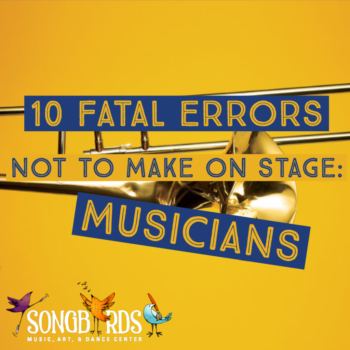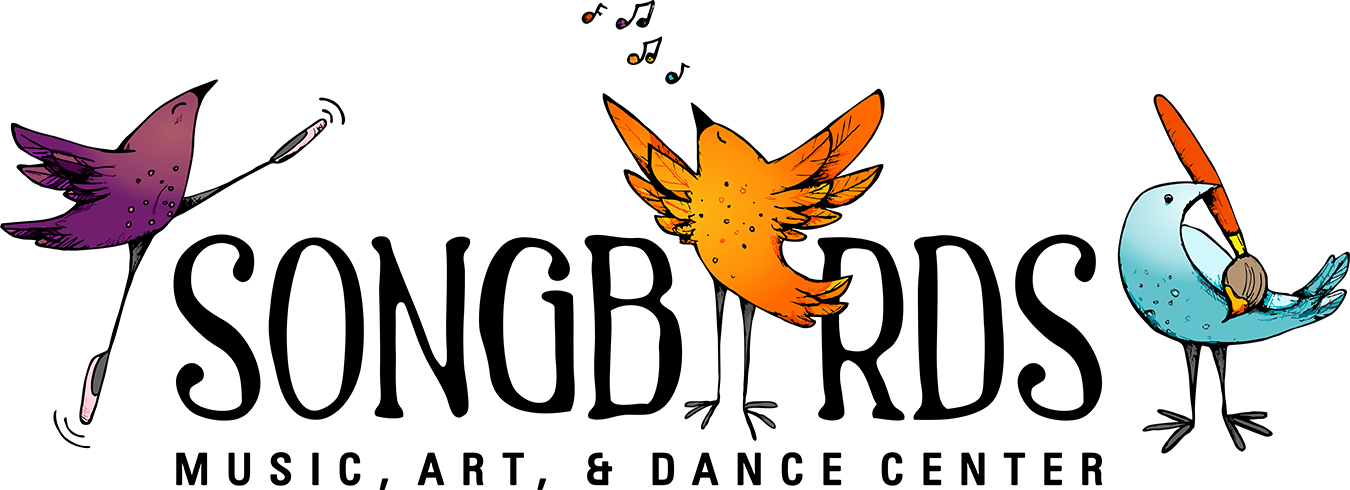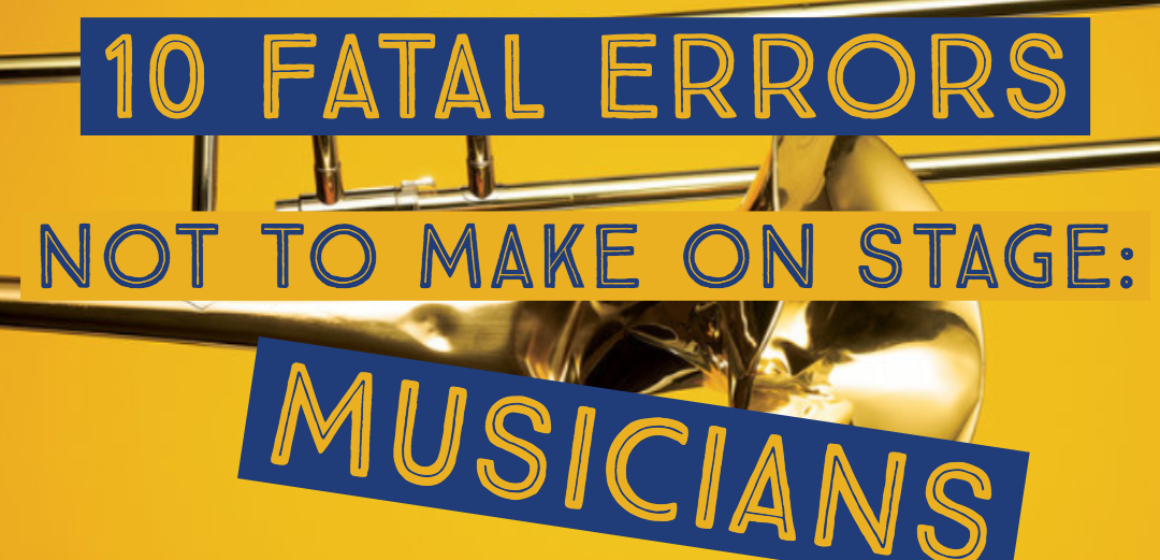10 Stage Errors for MUSICIANS

Performing any kind of music for a live audience can be terrifying! With so much pressure on what to do correctly, it’s easy to forget about the silly things not to do. Read these ten tips in advance to help your next big performance go smoothly! These points apply to all kinds of live music performance. Also, if you have committed one of these performance “crimes”, don’t sweat it! We all make mistakes – that’s how we learn. Here’s to making better music and a more engaging live show:
Don\'t Apologize from the Stage
This is a really big one. No matter what happens, never, ever apologize from the stage. Performers often apologize for feeling under the weather, starting a song incorrectly, or missing a performance cue. Even if you are playing an important solo with a big orchestra and completely miss your cue, keep playing and find your way back to the correct music as quickly as possible. The show must always go on.
When a performer apologizes to the audience, the entire mood in the room shifts. The performer was originally there to take care of the audience and provide them with an enjoyable musical experience. After an apology, the audience suddenly finds themselves in an awkward position where sympathy must be offered. It makes the crowd uneasy and it invalidates the remaining musical performance. Even if the absolute worst happens during your performance, resist the urge to offer any kind of apology or concession!
Don\'t Break Character
Continuing on from the previous point, never break character or lose face if something goes unexpectedly wrong. Your mettle will be tested in live performance and the craziest things will go wrong – it’s just a fact of the trade. (Kind of like that one time I was playing guitar in a show and the output jack (wires included!) tore out of the instrument.) Unless it’s an emergency situation, the show must go on. It’s likely that the audience won’t even notice what happened. You’d be surprised at what insane things can happen that the average listener won’t realize. If you are able to rescue a performance from disaster, especially during a live stage show like a musical or opera, it speaks volumes for your professionalism!
Don\'t do Something for the First Time in a Performance
This one is also huge. Never, ever, experiment in front of a live audience! Stage shows have a script or score – write one for yourself if you are a gigging musician or are performing at more intimate venues. Once you know your show, never deviate from it. If you are tired of something and are able to change it, do it at home or in your private practice time. Then, and only when it’s ready, add it to your live performance. Experimenting and trying new things in front of an audience, especially a paying one, is akin to playing with fire. You will get burned eventually. If your show requires legitimate musical improvisation, make sure that you know the exact chord structure of the tunes and have worked out some appropriate licks in your practice time.
Don\'t Go On Under-Prepared
Like above, don’t attempt to “wing it” during a live show. Remember that amateurs practice until they get it right. Masters practice until they can’t get it wrong. Don’t attempt something live until you know it forwards, backwards, and upside-down. This is particularly important for memorization. If your memorization is soft, you will likely forget the words or blocking as soon as you step on the stage.
Don\'t Attempt New Tricks
If you really want to add an optional high note to your favorite aria, but can only hit it most of the time in practice, it is not a good idea to test-drive it on stage. Likewise, a technically-challenging instrumental passage that isn’t perfected won’t fare well in performance. Most musicians perform about six months behind their progress in the practice room or in lessons. Be patient and wait for the right time to show off your new skills. They take longer to develop in your body than you may think.
Don\'t Go On Without Testing Your Gear
Even if you are running behind and the clock has run out, take a minute to test all of your gear, especially your electronics. A bad cable or failed battery can absolutely destroy an otherwise perfect set. Likewise, classical musicians should ensure that their instruments are in tip-top shape. All musicians, especially vocalists, need to alot consistent time for warming up and getting ready. The first note that you play or sing for the day should not be the first note of your stage performance. This error is easily avoidable by prioritizing your warmup and triple-checking all of your gear connections.
Don\'t Slack if the Audience is Small
Every performer knows the feeling of positive energy when the audience is large and eating up every note. It’s addictive and wonderful! But what happens when the audience is small or if you are hired to be glorified background music? Don’t give in to the urge to play sloppily or without passion. Every audience, no matter how small, deserves to hear and experience your best performance. You never know who may be listening and what doors may open for you.
Don\'t Kill Time or Drag it Out
No one likes their time to be wasted. If you have a live set but are unable to fill the complete time, do not fill time by rambling to the audience, tuning your guitar again, or doodling over the same three chords. It is far better to end the set a little early or play a song again than to string your audience along. Likewise, if you are a stage performer, don’t take more time on stage than what was rehearsed. Overacting is dangerous and doesn’t end well for most performers. Say your lines just like you practiced and don’t deviate from the script.
Don\'t Go Over Time
This one is vital if you want to be hired again! Don’t perform over your allotted time. If the venue hired you to play one hour, don’t push it to one hour and five minutes. There may be other performers lined up after you, and if you are working in an opera house or symphony, Union Time* will likely kick in. If the venue is small and you are the only act of the night, you might be able to extend your time by directly asking the venue manager or whoever is in charge. Be sure to respect their answer! Never, ever demand more time by coercing the audience to do it for you.
*In most performance houses, this means that the entire orchestra staff must be paid for the next hour per their contract! That’s a hefty bill!
Don\'t Be a Diva or Divo
Thankfully, the era of the diva is coming to an end. People who act overly self-important or not as a team player won’t get rehired in most situations. However, the music field is still smarting from the wounds of the diva. Always be kind and eager to help your colleagues. Go out of your way to thank the venue staff and any guest performers who may be working with you. Ask if you can help with tear-down or set-up if appropriate. Essentially, be the helpful and easy-going person that you would want to have working with you. If an issue does arise or your feelings get hurt, try to take a step back and view the situation from all perspectives. A haughty retort won’t benefit anyone. At the end of the day, every musician and the staff that make the show happen are all there to make music and collect a paycheck. Personal feelings or grudges rarely come in to legitimate play when there is a job to do.
There you have it! Ten Fatal Errors Not to Make on Stage. Use these tips to help streamline your next big performance experience! Read here for more awesome articles, and stay tuned for our next blog!

